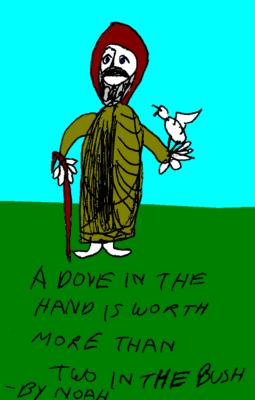Review of the failure movie “Noah”
As published on Nov 14, 2013: Noah – Official Trailer
Release Date: March 28, 2014
The above trailer is probably all that is worth watching from the move “Noah”. We recommend that you not waste your money on this disappointing anti-biblical movie. Here are excerpts from the screenplay review that was posted on WND as of Feb. 18, ’04:
In one scene aboard the famous Ark, Noah’s monologue gives a day-by-day account of creation, almost right out of the Bible’s book of Genesis. But the screenwriter’s directions for what appears on screen doesn’t reflect six, single “days” of creation, but rather millennia passing in between each “day” and an evolutionary process enfolding long before the arrival of Adam and Eve…
But then the screenwriter describes what audiences will see while Noah is talking: “Soon there are vertebrates: fish, eels, all life under the sea. We follow one creature and with each frame it morphs into a new creature, a distant descendant, evolving as time shoots by at unimaginable speeds. This evolving creature swims underwater dodging other evolving creatures. Above the surface of the water we catch glimpses of dinosaurs ruling the planet.” After Noah describes the sixth day of creation, the screenplay continues: “And still our ancestor evolves. Moving away from the water. Up through the chain of mammals. And soon our distant primate fore-father [sic] swings through the trees above the earth. Some form of monkey. Still evolving.”…
As WND reported, this creation scene isn’t the only place where Aronofsky’s “Noah” film wildly diverges or even flatly contradicts its scriptural source material. For example, while in the biblical account of Noah and his famous Ark, G-d is so grieved by wickedness, corruption, violence and evil in the world that He resolves to destroy all the earth’s creatures by flood, G-d’s grief in “Noah” is less about murder and violence, more about abuse of natural resources.
In the movie’s pivotal early scene, when Noah’s wife asks him why the Creator is planning to destroy the world, Noah gets a vision of the pristine environment before mankind, a taste of the barren land after humanity’s crimes against the planet and responds, “Because it is dying already. At our hand, all He created is dying. … If we work to save it, perhaps He will too.” Later in the film, Noah asserts, “We must change. We must treat the world with mercy so that the Creator will show us mercy. … We must respect the ground. Respect the rivers and seas. Respect the other beasts of the Earth. Stop the slaughter, the rape, the carnage.”
This environmentalist message, which Aronofsky freely admits is a “big theme” in the film, is even taken to the extreme, when Noah later decides to kill his own grandchildren so the earth won’t again be poisoned by humanity’s carelessness…
“The world of Aronofsky’s Noah is a bleak one,” Stone writes. “Noah decides the only reason G-d preserved him and his family is to make sure the animals on the Ark return to the earth safely. If mankind disappeared, ‘it would be a better world.’ His family should have no more births so that humans will eventually die out and then ‘the creatures of the earth, the world itself, shall be safe.’ But one of his daughters-in-law is pregnant. If it is a boy, Noah will let it live; but if it is a girl, it will be killed. The woman gives birth to twin girls and Noah sets out to kill them both while the animals on the Ark help pin down his family. But he’s too weak to carry out his task. ‘I can’t do it,’ he says to himself and to G-d. ‘I am sorry.’”
In an October 2012 blog post, Godawa explains why the near murders upon the Ark in Aronofsky’s “Noah” are such an affront… “The movie script for ‘Noah’ is deeply anti-biblical in its moral vision,” Godawa writes. “While the Bible commands mankind to ‘work and keep’ the garden of earth as its stewards, the sin that brought about the judgment of the Flood was not violence against the environment as depicted in the script; it was violence against G-d and His image in man. That’s no minor difference.
“Also, at the end, when psycho Noah realizes that he cannot kill the baby girl to stop the human race, the reason is not because he realized he was too extreme against humans, but because he was too weak to follow through… Godawa continues. “This Humanistic worldview [is that] man’s weakness of compassion makes him superior to G-d. Most of the last half of the script is a family killer thriller like ‘Sleeping With the Enemy,’ that asks the dark dramatic movie question, ‘Will Noah kill the child if it is a girl or not?’ Ancient sex-selection infanticide,” Godawa writes. “But in the end, he fails.”…









